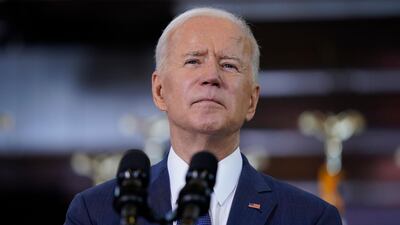For years American presidents have been judged by their first 100 days in office. That measure of political vigour came as a result of President Franklin Delano Roosevelt’s remarkable first 100 days in 1933 during the Great Depression. It was a time when a quarter of Americans were unemployed; people queued up at soup kitchens; shanty towns sprang up on the edges of US cities.
The 1930s American song Brother can you spare a dime captures the hopelessness of the period. The words touch the heart even now, a worker lamenting the death of the American dream and reduced to begging: "They used to tell me I was building a dream / With peace and glory ahead / Why should I be standing in line / Just waiting for bread?"
Roosevelt offered his “New Deal,” and in his first 100 days he managed to get 15 new laws pushed through the US Congress to kick start the US economy and do something more: to rebuild faith that government in America could actually help people. Since then, the start of presidencies has been marked by a search for similar landmark achievements.
In 1981, Ronald Reagan came into the White House during a very different crisis, trying to secure the release of US hostages in Iran. But he also had an ideological agenda exactly the opposite of FDR's. Roosevelt thought government was the solution to America's most intractable problems – poverty and the economy. Reagan thought government itself was the intractable problem. He used to quip that the scariest words he had ever heard were: "I'm from the government and I'm here to help."
Now it is Joe Biden's turn. At 78 he is the oldest person ever to assume the office of the presidency and that is said to be what spurs him on. In the past two weeks he has announced quite astonishing spending plans to pull the US out of the coronavirus crisis, and do much more besides. The first pandemic in more than 100 years has killed more than half a million Americans, and eliminated 10 million US jobs.
In Minneapolis, the trial of Derek Chauvin, the white police officer charged with murdering the African American George Floyd reminds all Americans of their deep racial divisions – while the storming of the US Capitol by Donald Trump supporters reminds the entire world that America's political and cultural divisions are equally intractable.
Mr Biden’s spending plans are of an order not seen since Roosevelt in the 1930s – so great they constitute a new “New Deal” for the 21st century. They address two serious problems which concern almost all Americans, whatever their politics.
The first is coronavirus. Mr Biden is spending $1.9 trillion on his pandemic relief act, much of which will go to help the least well off Americans. The second thing most Americans worry about is that for all their greatness and patriotism, quite a lot of things in America do not work very well.

Roads, bridges, airports, water supplies, railways, communications systems, ports and other parts of their infrastructure are creaking, substandard and in some cases, literally falling apart. That is why Mr Biden is spending another $2.25 trillion on rebuilding America’s infrastructure through a massive public works programme. The money involved is so great that for most of us, it’s almost incomprehensible.
But the politics behind the Biden new “New Deal” are easy to understand. It’s not just jobs and bridges and roads that Mr Biden is building, it is America’s faith in the idea that government can do things for ordinary Americans to make their lives better.
In 2016 Donald Trump also promised all kinds of immense infrastructure projects, a trillion dollars to be spent on “many, many bridges that are in danger of falling". But Donald Trump’s infrastructure promises, like building his famous “wall and making Mexico pay for it”, proved to be precisely the kind of loose talk that destroys faith in governments and politicians. For Mr Biden therefore the risks are enormous. If – like FDR and unlike Donald Trump – he follows through with his plans, and voters see real change in their neighbourhoods, roads, bridges and the rest, he will boost jobs, boost the economy and – to rework Mr Trump’s favourite phrase – make America great again, but for real.
The result will be that a country which has often been suspicious of Big Government may decide it's not so bad after all. With interest rates low, voters may even be able to have it all – massive public spending and no significant tax rises. More Americans will find work in all those building programmes, and high employment will increase the US government's tax take. That's the optimistic scenario, an American economic sweet spot.
If it goes wrong, and he raises corporate taxes rise significantly, Americans may not be so grateful. It’s worth recalling another of Mr Biden’s Democrat predecessors, Bill Clinton. He, too, wanted to follow Roosevelt but a right wing Republican backlash swept through Congress forcing Mr Clinton to say in 1995 that “the era of big government is over". Joe Biden’s spending spree means in the 2020s, America’s era of big government is back. The big political question is what the post-Trump Republican party can do about it, if anything.
Gavin Esler is a broadcaster and UK columnist for The National











